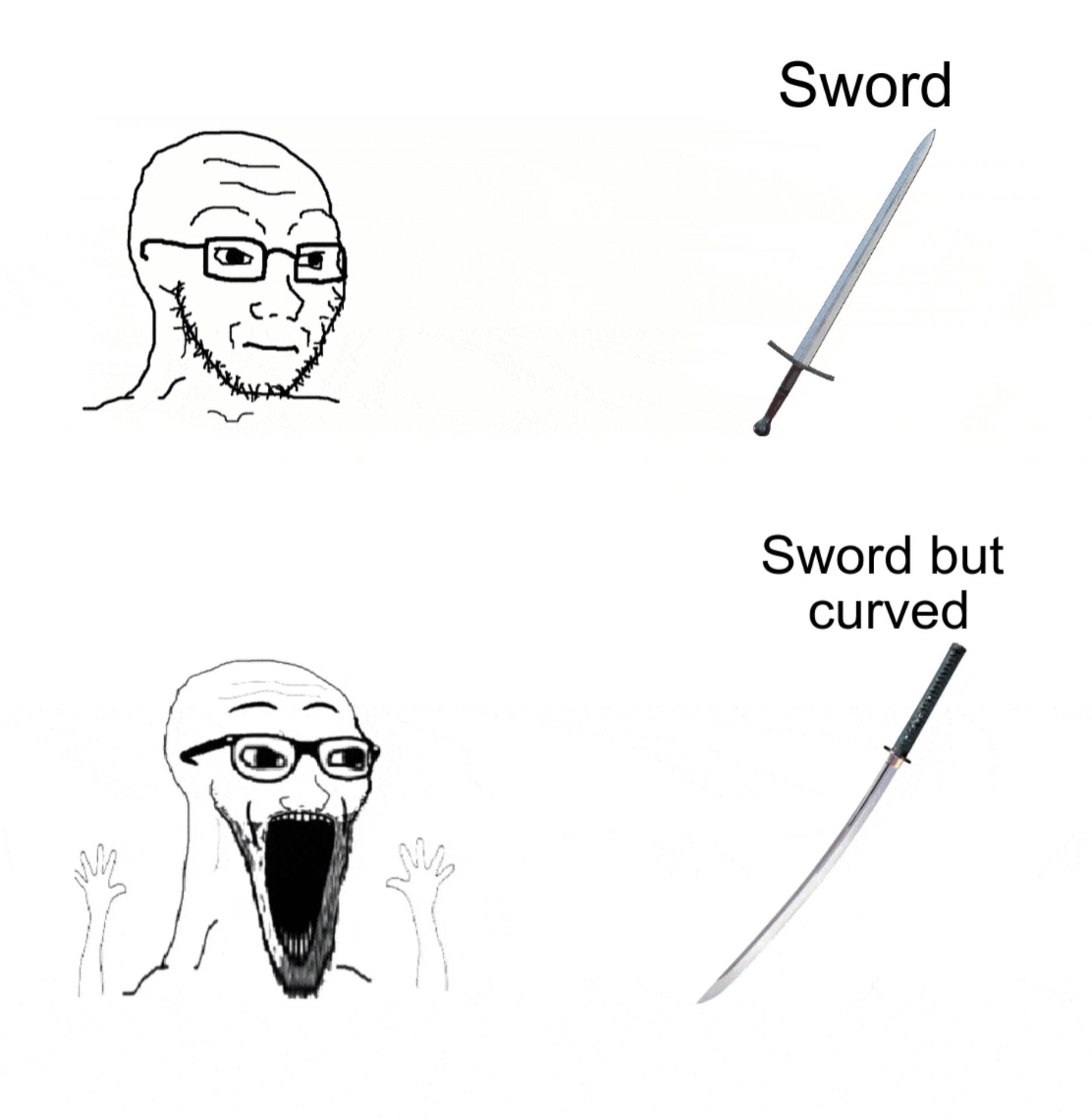this post was submitted on 27 Sep 2024
539 points (96.9% liked)
Memes
45704 readers
1197 users here now
Rules:
- Be civil and nice.
- Try not to excessively repost, as a rule of thumb, wait at least 2 months to do it if you have to.
founded 5 years ago
MODERATORS
you are viewing a single comment's thread
view the rest of the comments
view the rest of the comments

While you were out there whacking your straight stick, I spent years studying the blade...
The whole "Japanese steel was really weak" thing is as much of a myth as the whole "katanas are super powerful superior weapons" thing.
They're all just swords, and don't make that much of a difference either way.
According to whom?
The reason why Japanese iron is inferior is because of the source of the iron itself, they utilized iron sand instead of rock ore. Rock ore can be made up to 90% ferrous material while the iron sand contains as little as 2%.
This means when you smelt your source material into blooms of iron and slag, the blooms made from sand iron were much smaller. Instead of utilizing a single bloom to make a sword, the Japanese had to work several blooms together. Which is much more labour intensive, and can lead to a lot of imperfections in the final product.
This is why katanas were made out of so little material, and had to be handled with care. They were much more fragile pieces than similar swords made in Korea and China at the time.
Plus, the Japanese developed their iron working much later than their mainland contemporaries, as they never independently invented furnace technology. The technology for furnaces was imported, most likely from the Korean peninsula.
There's also smelting. Japan didn't have the technology to completely melt iron, which complicates things.
What century of katana are you speaking about? Many katana were used with modern metallurgy technology and imported steel. Do you think modern Japanese created cars are also made from steel refined from sand? Do you think the guns Japanese Samurai used were made from steel refined from sand?
Lol, my dude. No one is claiming that modern japanese steel is of poor quality.
Im speaking of the time period contemporary with the accusation. You know, how arguments typically work......
Just pointing out this one because it's funny. Yes, a lot of the early firearms made in Japan were still made from iron sand (Satetsu). Which was the main source of iron in Japan until the 16th century.
There was nothing inherently low quality about using iron sand anyway. Impurities were carried away by slag and the iron in the sand was easily recovered using washing and later electromagnetism. Imports were used as demand increased.
You are conflating the elemental molecule of iron with the finished product of an alloy of carbonized iron aka as steel.
Yes, there isn't a molecular difference between the iron found in sand vs the iron found in rock ore. However, the medium in which you harvest your iron and how you're able to heat that iron, dictates the quality not your final product.
The truth is that the steel made from Iron Sand was not lower quality than the Steel made from other sources of Iron.
That's not true, no matter how many times you make that unsupported claim.
Holy shit you're wrong, now with references
https://gunbai-militaryhistory.blogspot.com/2018/02/iron-and-steel-technology-in-japanese.html
My dude, nothing in that blog supports your claim.
First of all, it's talking about the metallurgy of the 16th century and after, which is after Japan had imported blast furnaces. Secondly, it ignores the amount of labour needed to actually produce refined steel from iron sands, which ultimately dictates the quality of the finished product.
This isnt a debatable topic, any steel made from iron sands before modern electromagnetic sorting contains a large amount of impurities when compared to steel made from rock ore.
Even during WW2 the Japanese had a hard time producing high quality steel even with the use of blast furnaces, because the iron sands contains a large amount of titanium.
This blog which falls over itself trying to engage in revisionist history, can only claim that the quality was "perfectly fine"....not good.
You've proven yourself wrong.
Mochi Tetsu is mentioned in that article as being a source that produces higher quality products than iron sand. Exactly what you're arguing against.
The facts are that due to the limited availability of good quality iron ore the steel produced in Japan often used iron sand and that led to lower quality products.